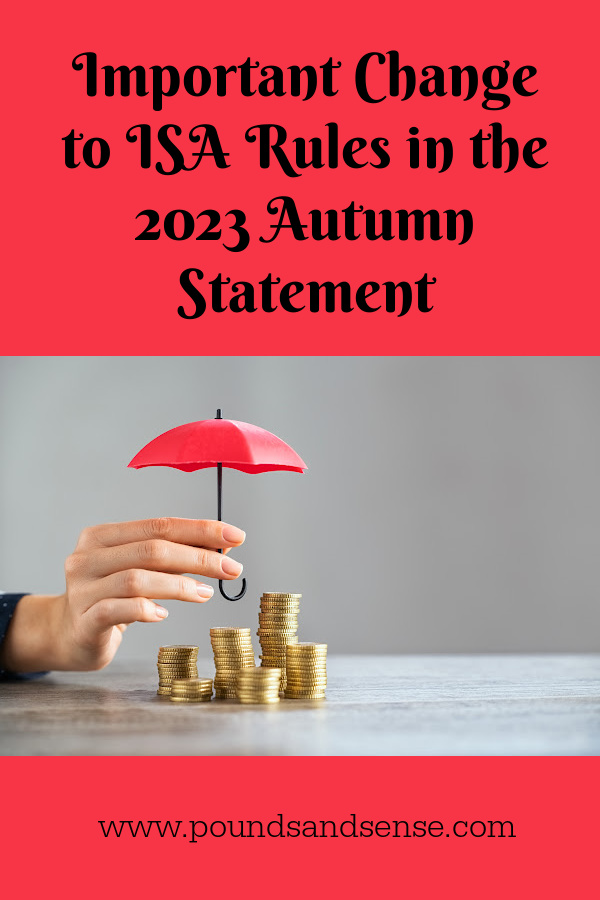Important Change to ISA Rules in the 2023 Autumn Statement
As you will doubtless know, yesterday the Chancellor delivered his 2023 Autumn Statement. This included various economic measures, which you can read about on the Moneysaving Expert website (among other places).
I thought today I would highlight one particular change to the rules about tax-free ISAs (Individual Savings Accounts) which caught my eye. From April 2024, you will be allowed to open more than one of any particular type of ISA in a single tax year. This is a change I was particularly pleased to see, and have in fact been advocating on Pounds and Sense for some time.
As you may know, there are various types of ISA, including the stocks and shares ISA, cash ISA and IFISA. The latter stands for Innovative Finance ISA and allows people to save tax-free with peer-to-peer lending and similar platforms. Everyone has an annual tax-free ISA allowance, which currently stands at £20,000. Despite rumours to the contrary, this limit was not changed in the Autumn Statement.
So why do I think the change in the rules announced yesterday is so important? Well, for one thing, it brings about much greater flexibility in ISA transfers. Investors will now be able to transfer funds freely between different types of ISA without jeopardizing their tax-free status. They will also be able to transfer just part of a holding to a different provider, regardless of when they paid in the money.
This will empower investors to optimize their investment strategy by making it easy to move money between cash, stocks and shares, and Innovative Finance ISAs. This enhanced transfer flexibility should enable investors to adapt to changing market conditions, seize new opportunities, and align their portfolios with their evolving financial goals.
A further benefit of the rule change is that it will make it easier for investors to build a well-diversified portfolio. Rather than having to put all their money into just one stocks and shares ISA per year (for example) they can divide it among a range of providers. Regular readers will know that I am a big fan of diversifying your portfolio as much as possible to help manage risk, and this rule change certainly facilitates that.
The change will also make it easier for investors to try out new platforms with relatively small investments initially. Previously they may have been deterred from doing this by the realization that once they had committed to one particular provider, they would have to stick with that provider for the rest of the financial year. FOMO (fear of missing out) may even have inhibited some people from investing at all.
- This is certainly something I’ve experienced myself. At the start of a new financial year, I was wary of investing in any type of ISA, because I knew that once I did so, I would then have to stick with that provider for that type of ISA for the rest of the financial year.
So those are just some reasons I particularly welcome this rule change. From a broader perspective, I think it will also encourage more people to start investing, which has to be good for UK PLC in general. Apart from a few admin costs, it seems to me this measure will cost the government nothing, while bringing major benefits to the economy and individual investors. Really, the only thing I don’t understand is why it wasn’t done sooner!
So those are my thoughts anyway. But what do you think? Will the new rule encourage you to make more use of ISAs in future? I’d be interested to hear any views.


November 23, 2023 @ 11:52 am
Yes, I noticed this too, Nick and welcome it. I don’t like putting all my eggs in one basket so welcome the opportunity to diversify from next April!
November 23, 2023 @ 12:09 pm
Thanks, Sally. Yes, absolutely!
November 24, 2023 @ 5:24 pm
The rule to contribute in only one ISA of a kind per year didn’t make sense anyway.
November 25, 2023 @ 8:17 am
Thanks, Maria. Indeed, it seemed entirely counterproductive. The only explanation I have seen is that it made the annual ISA allowance simpler to administer and enforce.